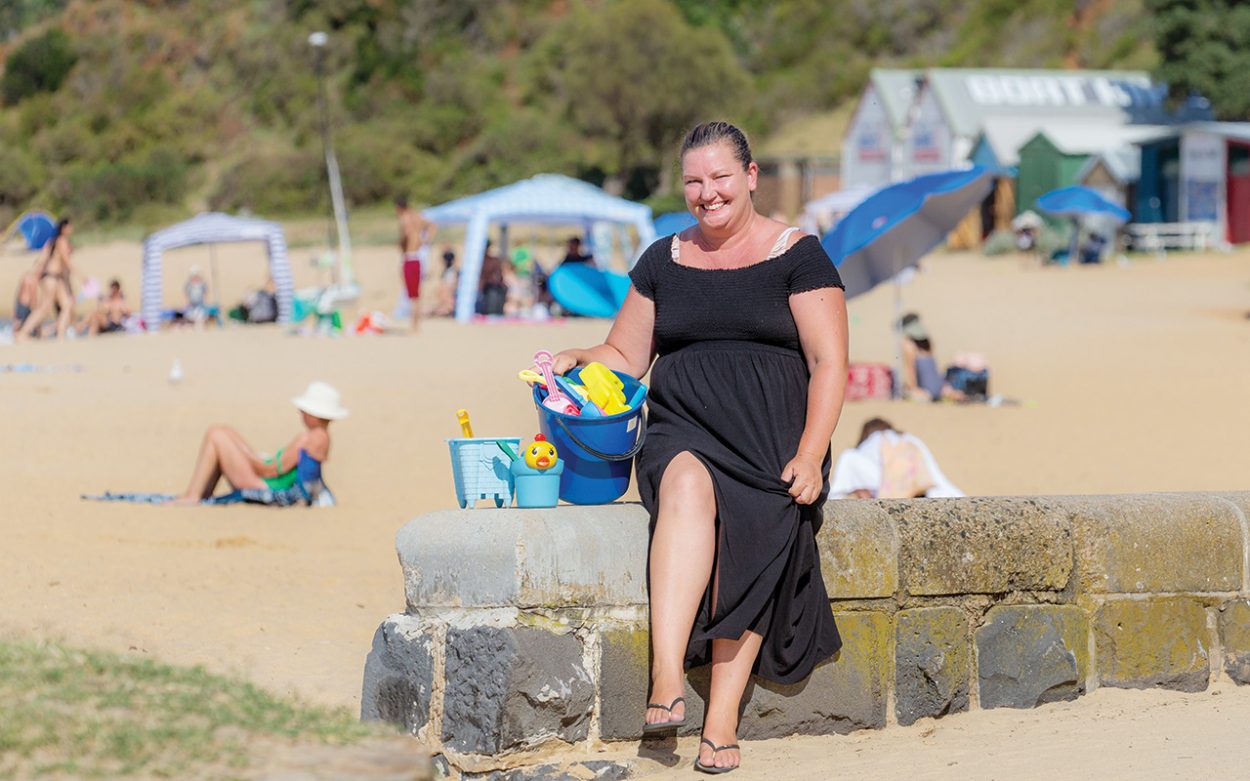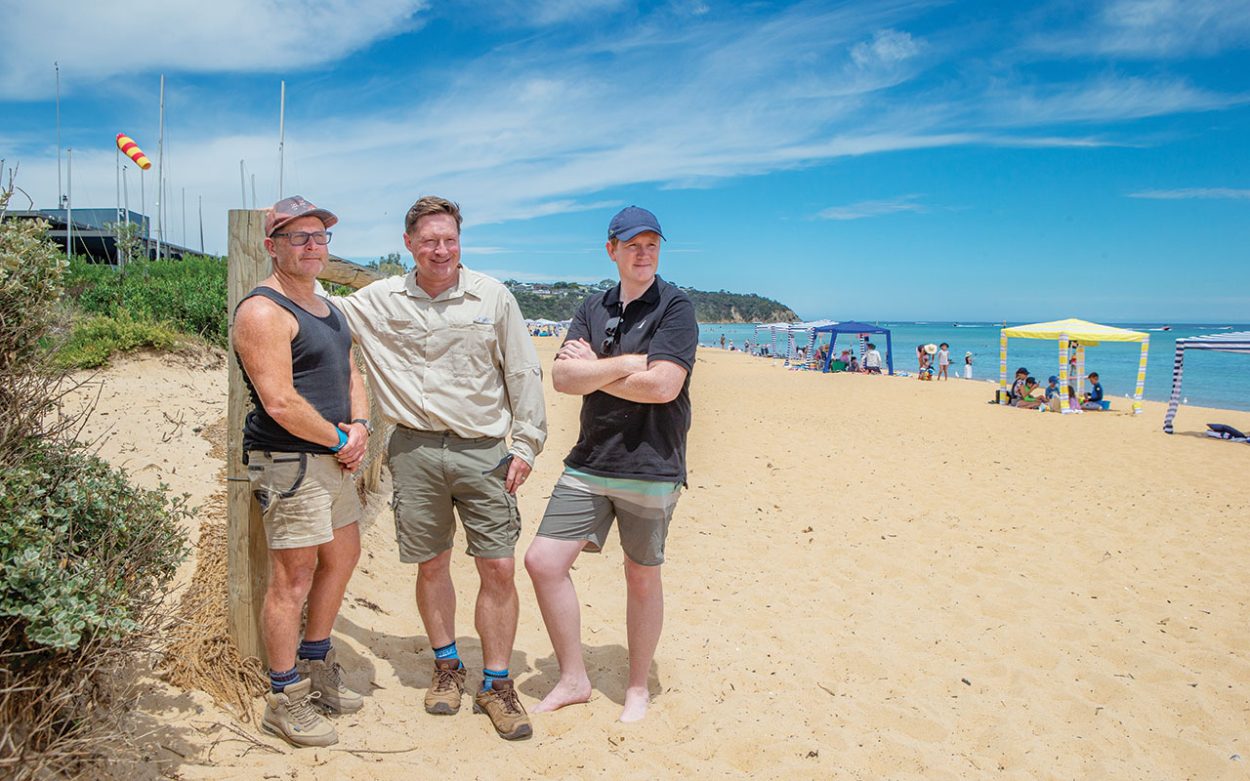A CONTENTIOUS hand beach cleaning trial launched by Mornington Peninsula Shire has come under fire for failing to meet the “community’s expectations” with reports of litter and seaweed having increased.
The shire is currently undertaking a 12-month trial that involves cleaning all Port Phillip beaches solely by hand on a fortnightly basis instead of a mechanical rake, which was found to have only removed about 40 per cent of litter, according to the shire. However, while mechanical raking does create an aesthetically pleasing groomed look, it has been known to leave behind broken bottles, shredded plastic and even hypodermic needles.
Deputy mayor Cr Paul Pingiaro voiced his concerns at the council’s 18 December meeting, noting 82 per cent of respondents to a community survey had reported beaches “are less enjoyable to visit” because of hand cleaning, and had seen a rising presence of seaweed and litter since the trail began last July. “This dissatisfaction, coupled with increasing complaints, indicates that the trial is failing to meet the community’s expectations for a clean, safe, and enjoyable beaches,” he said. Pingiaro successfully moved an “urgent business” motion for a report to be brought to the council’s first meeting in January to consider ending the trial “with immediate effect” and reinstating a mechanical rake method.
A report will also come back by April to explore a hybrid approach of hand and mechanical methods, informed by community and broad industry consultation. Crs Williams, Pingiaro, Allen, Ranken, Batty and mayor Cr Anthony Marsh voted in favour of the motion to considering ending hand beach cleaning. Voting against was Crs Gill, Stephens and Binyon.
Gill said he could not support the motion because the “interpretations we’ve been hearing are just assertions” and “our beaches are now cleaner than they have ever been because of hand cleaning”.
Last year, Gill said mechanical raking “doesn’t work” and should be replaced by “environmentally friendly hand cleaning that protects children from hidden dangers” (Hands up for beach cleaning, The News 15/7/24).
Award winning beach cleaning campaigner Josie Jones OAM, who had initially pushed the shire for a hand cleaning trial, defended its effectiveness. “This is an incredible opportunity for us to actually reassess our coastline based on federal, state and local plans that all aim for low impact solutions for our coastlines,” she told The News. “Sending a four-tonne tractor with a raking device is not low impact and we are seeing the following benefits … we’re not flattening the beach, and the beaches are starting to get berms on them, those berms actually help stop erosion by leaving the wrack on the beach.” Wrack is natural material that washes up on beaches, including algae, sea grasses, and some invertebrates.
According to Jones, data showed there was “actually more wrack on the beach while the rake was still in effect than there has been recorded in the first and second quarter of the test”. Jones added the hand cleaning was also improving the ecosystem and biodiversity including saltbush growth.
However, Pingiaro argued the hand cleaning practice was not addressing the issue of microplastics “which pose a threat to marine life and human consumption”. “Despite hand cleaning efforts, the pilot has not demonstrated the anticipated success of reducing litter and debris,” he told the meeting. “The manufacturers of beach rake cleaning machines are recognised worldwide for their efficiency. The surf rake is designed to remove larger debris while ensuring smaller particles are trapped,” he said. “The problem is further compounded by strong storms and winds from Port Phillip Bay that push rubbish into seaweed due to our west and northwest prevailing winds. This makes hand cleaning even more challenging.”
Pingiaro acknowledged while volunteer groups and beach patrols “play a massive and very critical role in providing data, as do contractors … often they have vested interests”. “The credibility of the trial is further compromised by the proper evidence of this verification of 166 syringes found during cleaning, raising questions of accuracy of such reports. “In fact, 13 syringes were once found in 300 meters … I’ve been on the beaches of Mornington and Mt Martha for 40 years. I don’t think I’ve found 13 syringes in my entire time.”
Mayor Cr Anthony Marsh told The News, “we’ve seen enough to know the current approach is not working and now we’re looking to work with community and industry to find that balance/compromise that’s in the best interests of the various user groups”. Marsh said there were concerns raised of beach litter having increased at the front of Mt Martha Life Saving Club including sharp sticks, chunks of concrete, and pine pieces, and a glass bottle among other items found in the sand. In this case, he said given a nipper’s state-wide competition would be held at the club on January 19, hand cleaning would be brought forward two days before the event as a “duty of care” to ensure the safety of all participants.
Marsh said he believed where there were areas of high beach activity it made sense to use mechanical cleaning methods, but added this would be made on a “case by case” basis as it would be “appropriate in some instances” to use hand cleaning, which was the original recommendation made by shire officers.

The News understands that four shire workers are paid for hand cleaning the beaches with several community volunteers lending their support. Among the volunteers is Mornington resident Melanie Bird, who has spent hours cleaning beaches by hand since December, and although it may be labour intensive she is driven by a deep passion to protect the beaches.
“I’m not paid a single cent, I’ve done it for years and have joined the beach patrol group, as well as monitoring how much rubbish is left on the beach through the trial and reporting back the statistics to council,” she said. “What we used to find on the beach was the broken glass, crushed up cans, and a lot of broken things … now we are finding whole items that’s a lot easier to pick up. “We’re all passionate for our beaches, it’s a beautiful place and I would personally like to see it remain clean and safe.”
Bird said she had collected several children’s toys that she found along the beaches, which had been “formerly broken up and taken to landfill” at a cost to council under the mechanical rake method. She now intends to use all the collected toys including little plastic rakes, buckets, spades, sea animals and more to open a toy library at Mother’s Beach in Mornington in the coming days.
First published in the Mornington News – 14 January 2025


